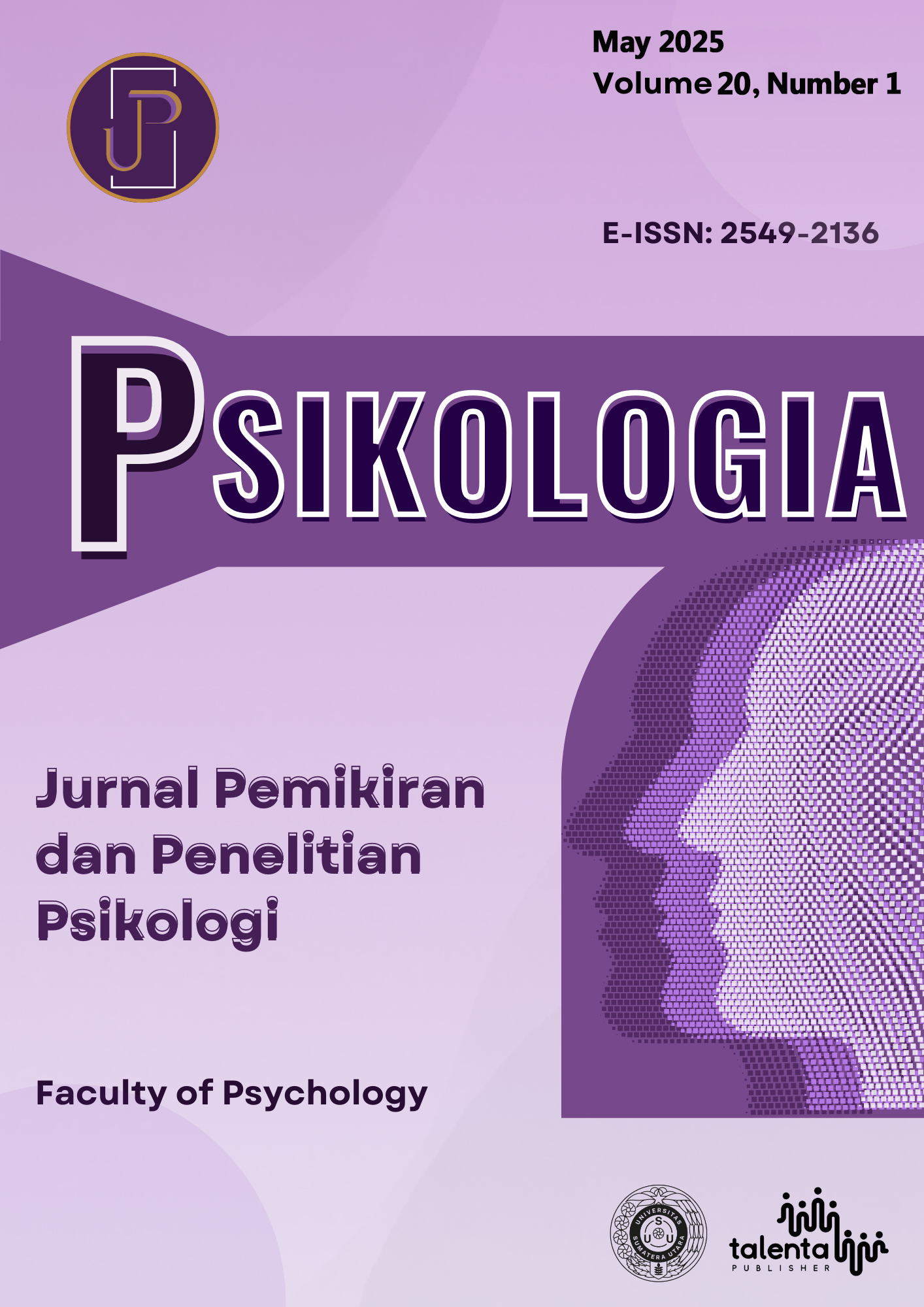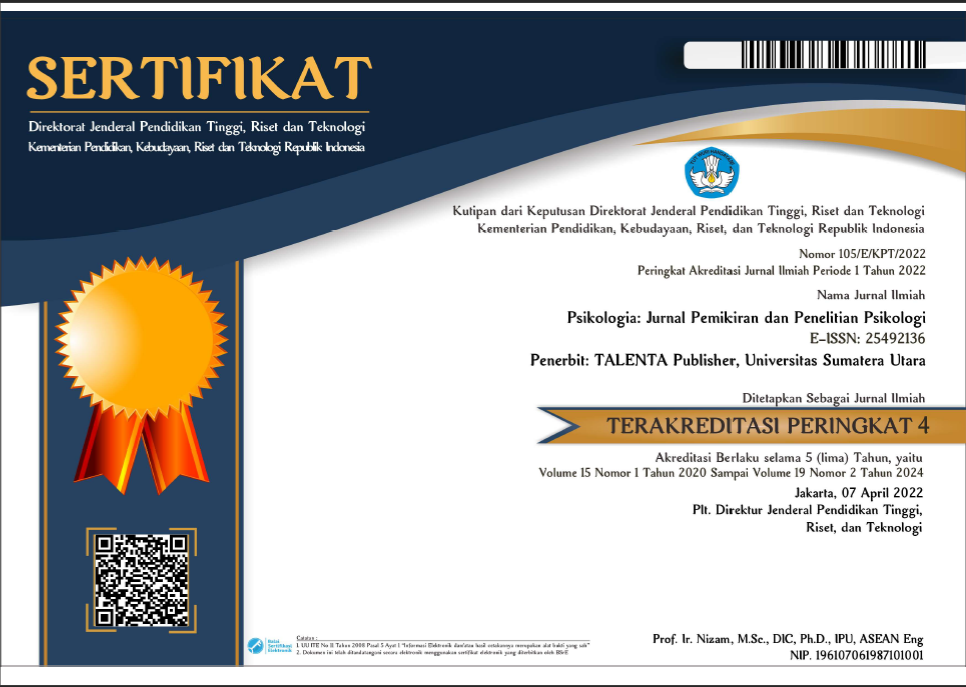Organizational learning culture and work engagement: the serial mediation effects of competencies and job crafting
DOI:
https://doi.org/10.32734/psikologia.v20i1.18995Keywords:
learning culture, competencies, crafting, engagementAbstract
Organizational learning culture (OLC) refers to a set of norms that facilitate continuous learning across all levels of the organization. OLC is believed to enhance employee work engagement, but it remains an area that requires further investigation due to its complexity and the varying impacts it may have. The relationship mechanism can be explained by increasing employee competencies in organizations with a learning culture. As competencies improve, they expand individual resources, enabling employees to craft their jobs with personal needs. Adopting the Conservation of Resources theory, researchers propose a resource caravan principle where employees are more likely to engage in organizations with a learning culture. Using a sample of 206 Indonesian employees, the data were analyzed using covariance-based structural equation modelling (CB-SEM). The results indicate a serial mediation effect, confirming the sequential influence of culture on work engagement. These findings offer insights for organizations to adopt a culture aligned with their goals and for researchers to understand the sequential mechanisms driven by a learning culture.
References
Akkermans, J., & Tims, M. (2017). Crafting your Career: How Career Competencies Relate to Career Success via Job Crafting. Applied Psychology, 66(1), 168–195. https://doi.org/10.1111/apps.12082
Berdicchia, D., Nicolli, F., & Masino, G. (2016). Job enlargement, job crafting and the moderating role of self-competence. Journal of Managerial Psychology, 31(2), 318–330. https://doi.org/10.1108/JMP-01-2014-0019
Bindl, U. K., Unsworth, K. L., Gibson, C. B., & Stride, C. B. (2019). Job Crafting Revisited : Implications of an Extended Framework for Active Changes at Work. Journal of Applied Psychology, 104(5), 605–628. https://doi.org/10.1037/apl0000362
Bogale, A. T., & Debela, K. L. (2024). Organizational culture: a systematic review. Cogent Business and Management, 11(1), 1–23. https://doi.org/10.1080/23311975.2024.2340129
Chen, S., Westman, M., & Hobfoll, S. E. (2015). The Commerce and Crossover of Resources: Resource Conservation in the Service of Resilience. Stress Health, 31(2), 92–105. https://doi.org/10.1002/smi.2574
Díaz-Fernández, M., Cabrales, A. L., & Cabrera, R. V. (2014). A contingent approach to the role of human capital and competencies on firm strategy. BRQ Business Research Quarterly, 17(3), 205–222. https://doi.org/10.1016/j.brq.2014.01.002
Faul, F., Erdfelder, E., Lang, A. G., & Buchner, A. (2007). G*Power 3 : A flexible statistical power analysis program for the social , behavioral , and biomedical sciences. Behavior Research Methods, 39(2), 175–191.
Gallup. (2023). Employee Engagement Trends by Country. https://www.gallup.com/394373/indicator-employee-engagement.aspx
Hair, J. F. J., Black, W. C., Babin, B. J., & Anderson, R. E. (2018). Multivariate Data Analysis (8th-Edition ed.). Cengage Learning. https://doi.org/10.1002/9781119409137.ch4
Haruna, A. Y., & Marthandan, G. (2017). Foundational competencies for enhancing work engagement in SMEs Malaysia. Journal of Workplace Learning, 29(3). https://doi.org/10.1108/JWL-07-2016-0066
Hayes, A. F. (2022). Introduction to Mediation, Moderation, and Conditional Process Analysis: A Regression-Based Approach (3rd Editio). Guilford Press. http://www.guilford.com/MSS
Hobfoll, S. E., Halbesleben, J., Neveu, J. P., & Westman, M. (2018). Conservation of resources in the organizational context: The reality of resources and their consequences. Annual Review of Organizational Psychology and Organizational Behavior, 5(November 2017), 103–128. https://doi.org/10.1146/annurev-orgpsych-032117-104640
Hu, H., Hu, X., & Zhang, Y. (2024). Do income-welfare satisfaction and competency enhance work engagement among Chinese nursing home caregivers? ——A moderated mediating effect based on professional identity. Geriatric Nursing, 57, 169–178. https://doi.org/10.1016/j.gerinurse.2024.04.014
Ibañez, O. L., Rodriguez, S. M., Marques, N. O., Carrasco, M., & Amillano, A. (2021). Job crafting and work engagement: The mediating role of work meaning. International Journal of Environmental Research and Public Health, 18(10). https://doi.org/10.3390/ijerph18105383
Jorgensen, T. D., Pornprasertmanit, S., Schoemann, A. M., & Rosseel, Y. (2022). semTools: Useful tools for structural equation modeling. R Package Version 0.5-6. https://cran.r-project.org/package=semTools
Kardas, J. S. (2023). Job Crafting Competences and the Levels of Self-Organization, Job Satisfaction and Job Redesign in a Mature Organization. Sustainability (Switzerland), 15(3). https://doi.org/10.3390/su15032253
Kim, J., & Jung, H. S. (2022). The Effect of Employee Competency and Organizational Culture on Employees’ Perceived Stress for Better Workplace. International Journal of Environmental Research and Public Health, 19(8). https://doi.org/10.3390/ijerph19084428
Kim, J., Lim, D. H., Yoon, S. W., & Kim, H. (2024). Relationships among learning organization, resistance to change, job crafting, and innovative work behavior in South Korea: public vs. for-profit sectors. Asia Pacific Education Review. https://doi.org/10.1007/s12564-024-09954-5
Kung, F. Y. H., Kwok, N., & Brown, D. J. (2018). Are Attention Check Questions a Threat to Scale Validity? Applied Psychology, 67(2), 264–283. https://doi.org/10.1111/apps.12108
Li, C. H. (2021). Statistical estimation of structural equation models with a mixture of continuous and categorical observed variables. Behavior Research Methods, 53(5), 2191–2213. https://doi.org/10.3758/s13428-021-01547-z
Marsick, V. J., & Watkins, K. E. (2003). Demonstrating the Value of an Organization’s Learning Culture: The Dimensions of the Learning Organization Questionnaire. Advances in Developing Human Resources, 5(2), 132–151. https://doi.org/10.1177/1523422303005002002
Mazzetti, G., Lancioni, C., Derous, E., & Guglielmi, D. (2018). Tackling job insecurity: Can a boundaryless career orientation boost job crafting strategies and career competencies? Psicologia Sociale, 13(2), 129–145. https://doi.org/10.1482/90779
Meher, J. R., Mishra, R. K., Panigrahi, R. R., Patel, G., & Jena, L. K. (2023). Does learning culture enhance organizational performance? A serial mediator with knowledge management and organizational intelligence. Knowledge Management Research and Practice, 00(00), 1–12. https://doi.org/10.1080/14778238.2023.2278729
Meher, J. R., Nayak, L., Mishra, R. K., & Patel, G. (2024). Impact of organizational learning culture on organizational effectiveness: a serial mediation analysis with knowledge sharing and employee competencies. VINE Journal of Information and Knowledge Management Systems, 54(2), 324–338. https://doi.org/10.1108/VJIKMS-10-2021-0230
Naqshbandi, M. M., Said, F., & Hisa, A. (2024). Organizational effectiveness: the role of culture and work engagement. Management Decision. https://doi.org/10.1108/MD-11-2023-2180
Nergiz, H. G., & Unsal-Akbiyik, B. S. (2024). Job Crafting, Task Performance, and Employability: The Role of Work Engagement. SAGE Open, 14(3), 1–18. https://doi.org/10.1177/21582440241271125
Oh, S. young, & Han, H. seok. (2020). Facilitating organisational learning activities: Types of organisational culture and their influence on organisational learning and performance. Knowledge Management Research and Practice, 18(1), 1–15. https://doi.org/10.1080/14778238.2018.1538668
Otoo, F. N. K. (2024). The mediating role of organizational learning culture in the nexus of human resource development practices and employee competencies. African Journal of Economic and Management Studies. https://doi.org/10.1108/AJEMS-10-2023-0387
Posit Team. (2024). RStudio: Integrated Development Environment for R. Posit Software. http://www.posit.co/
Potnuru, R. K. G., Sahoo, C. K., & Sharma, R. (2019). Team building, employee empowerment and employee competencies: Moderating role of organizational learning culture. European Journal of Training and Development, 43(1–2), 39–60. https://doi.org/10.1108/EJTD-08-2018-0086
PwC. (2024). Helping workers adapt to change in an age of transformation (Asia Pacif). PwC.
Rahmadani, V. G., & Schaufeli, W. B. (2022). Engaging leadership and work engagement as moderated by “diuwongke”: an Indonesian study. International Journal of Human Resource Management, 33(7), 1267–1295. https://doi.org/10.1080/09585192.2020.1799234
Rosseel, Y. (2012). lavaan: An R Package for Structural Equation Modeling. Journal of Statistical Software, 48(2), 1–36. https://doi.org/10.18637/jss.v048.i02
Salmela-Aro, K., & Upadyaya, K. (2018). Role of demands-resources in work engagement and burnout in di ff erent career stages. Journal of Vocational Behavior, 108, 190–200. https://doi.org/10.1016/j.jvb.2018.08.002
Schaufeli, W. B., & Bakker, A. B. (2004). Job demands, job resources, and their relationship with burnout and engagement: A multi-sample study. Journal of Organizational Behavior, 25(3), 293–315. https://doi.org/10.1002/job.248
Schaufeli, W. B., Bakker, A. B., & Salanova, M. (2006). The measurement of work engagement with a short questionnaire: A cross-national study. Educational and Psychological Measurement, 66(4), 701–716. https://doi.org/10.1177/0013164405282471
Slemp, G. R., & Brodrick, D. A. V. (2013). The job crafting questionnaire: A new scale to measure the extent to which employees engage in job crafting. International Journal of Wellbeing, 3(2), 126–146. https://doi.org/10.5502/ijw.v3i2.1
Tu, Y., Jiang, L., Long, L., & Wang, L. (2022). Leader secure-base support and organizational learning culture: synergetic effects on employee state promotion focus and approach job crafting. Career Development International, 27(5), 547–561. https://doi.org/10.1108/CDI-09-2021-0235
Wang, H. J., Chen, X., & Lu, C. Q. (2020). When career dissatisfaction leads to employee job crafting: The role of job social support and occupational self-efficacy. Career Development International, 25(4), 337–354. https://doi.org/10.1108/CDI-03-2019-0069
Wang, Y., Yao, M., Tse, H. H. M., Wang, Z., Shen, C., & Chen, Y. (2024). The interaction effect between role overload and skill training on older workers’ work engagement: the mediating role of job crafting. International Journal of Human Resource Management, 35(18), 3024–3052. https://doi.org/10.1080/09585192.2024.2391946
Downloads
Published
Issue
Section
License
Copyright (c) 2025 Muhammad Faidhil Iman, Alice Salendu, Rifdah Qotrunnada

This work is licensed under a Creative Commons Attribution-ShareAlike 4.0 International License.









